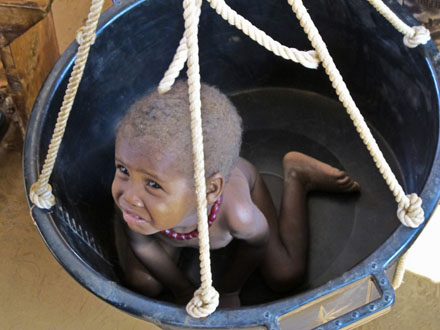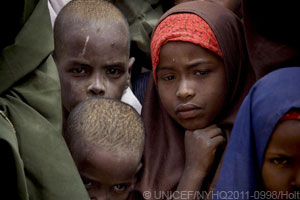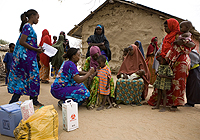Navigation
Your Help Desperately Needed by Millions of Starving People
More than 10 million people across the Horn of Africa are in dire need of humanitarian assistance due to a deadly combination of drought, escalating food prices and armed conflict. Hundreds of thousands of children are facing death due to starvation,” according to UNICEF.
 |
| Children arriving at one of five MSF-run health posts in Dadaab refugee camp, Kenya are weighed as one of the measures taken by the medical staff to check whether or not they are suffering from malnutrition. The medical teams also check the circumference of the children’s upper arm, as well as their height, to check whether or not they need therapeutic feeding or, in the most severe of cases, hospitalization. “Fighting in Somalia, restrictions on supply flights, international support staff as well as administrative hurdles have all contributed to the current hardship faced by the Somali population today,” said Unni Karunakara, International President of MSF. “It is essential that both restrictions and obstacles to humanitarian aid be removed as the situation continues to worsen.” Photograph © Serene Assir/MSF |
UNICEF and Médecins Sans Frontières (MSF) are among the organizations seeking your support for their humanitarian assistance.
“More than 10 million people across the Horn of Africa are in dire need of humanitarian assistance due to a deadly combination of drought, escalating food prices and armed conflict. Hundreds of thousands of children are facing death due to starvation,” according to UNICEF. "Access to clean water and sanitation is essential for securing the health and well-being of children," UNICEF said.
“The international community has a shared responsibility to help Somalis seeking refuge by ensuring efficient registration, adequate food rations and shelter in existing and new camps,” says MSF. “The current bureaucratic restrictions and obstacles are causing unnecessary delays and all measures should be taken to respond to the emergency.”
News and Calls for Help
from UNICEF and MSF.
UNICEF delivering for children in Dadaab refugee camp
 |
| With an estimated 1.25 million children across southern Somalia in urgent need of lifesaving care and 640,000 children acutely malnourished, UNICEF calls for all actors to make saving children's lives the top priority and to urgently support all efforts to reach children in need. Photograph courtesy of UNICEF. |
UNICEF is ramping up operations to meet the rising humanitarian needs of Somali children and families in the Dadaab refugee camps and surrounding host communities near the Kenya-Somalia border.
With an influx of new arrivals straining resources in the camps and host communities, UNICEF is delivering lifesaving support in nutrition, health, child protection, and water, sanitation and hygiene.
Somali refugees, 80% of them are women and children, arrive in Dadaab at an average rate of 1,300 per day, having survived the long trek from Somalia. The total population of the three camps near Dadaab is now more than 400,000. The population in the three camps in Dadaab is now equivalent to being the third largest city in Kenya.
Nearly half the children who make it to the camps from southern Somalia are malnourished. Reports of children dying along the way from Somalia or just as they arrive at the camps are disturbingly common.
"As they make the treacherous journey from Somalia to the Dadaab camp, many parents are forced into an unbearable choice of which child to feed. No parent should ever face that decision," said President and CEO of the U.S. Fund for UNICEF Caryl Stern. "UNICEF is using every means at its disposal to reach these children. Just a small donation can mean the difference between life and death."
UNICEF has increased supplies of ready-to-use therapeutic food to hospitals and nutrition stabilization centers in the Dadaab camps and surrounding host communities for the treatment of malnutrition in children under five.
UNICEF is also working with local health authorities to establish a therapeutic feeding center in the border community of Liboi to ensure that families crossing into Kenya have access to lifesaving health and nutrition services as quickly as possible.
UNICEF has dispatched medicine to the health center in Liboi, including health kits sufficient to support about 10,000 people, for use by the host community and for the treatment of refugees crossing into Kenya.
"Many Somali families who cross into Kenya at Liboi do not realize they must walk another 100 kilometers before arriving at the refugee camps in Dadaab," says Olivia Yambi, UNICEF Kenya Representative. "The health of some malnourished children crossing at Liboi is so precarious that they simply cannot wait until they get to Dadaab for treatment. The positioning of health and nutritional supplies close to the border will save children's lives that might otherwise have been lost on the long journey to Dadaab."
 |
| Community health workers immunize children under the age of five against polio and measles, and give them vitamin A and de-worming tablets, in a house-to-house campaign in the town of Liboi, north-eastern Kenya. Photograph © UNICEF Kenya/2011/Modola |
UNICEF is also supporting integrated campaigns for measles and polio immunization, deworming and Vitamin A supplementation, in Dadaab and the host communities in Liboi, Garissa and part of Wajir. More than 200,000 children under five will be reached through the immunization campaign over the coming weeks. More than 100,000 children have already been vaccinated.
"Malnutrition can weaken a child's immune system, increasing their susceptibility to infectious diseases like measles and polio,” says Ibrahim Conteh, UNICEF Dadaab Emergency Coordinator. “We are acting now because these diseases can spread very quickly in overcrowded conditions like we have now in the camps.”
Access to clean water and sanitation is essential for securing the health and well-being of children. In Dadaab, UNICEF is facilitating access to clean water for 22,000 refugees on the outskirts of the camps by providing 1,600 jerry cans and two water bladders. UNICEF is also working with partners to install 16 water points for refugees walking from the border along three major routes to Dadaab.
In education, UNICEF is planning to construct 146 new learning centers/classrooms in the camps to accommodate newly-arrived refugees and alleviate congestion in pre-existing schools. These centers will be situated in camp outskirts where many newly-arrived refugees live.
Prepositioned supplies have been used to address the influx of children in the camps, including 20 temporary learning spaces/classrooms, 100 education kits to meet the needs of 5,000 students, 60,000 Somali text books for children, and 64 recreation kits for 6,400 children and young people.
UNICEF and Save the Children have also reached more than 2,000 children in the camps over the past week through the provision of child-friendly spaces. UNICEF is participating in a UNHCR-led assessment of gender-based violence in collaboration with partners in light of the expansion of support to the camps and the host community.
Across the region, UNICEF estimates it will need nearly $315 million over the next six months to scale up operations to reach children in the Horn of Africa's drought-affected areas with emergency and preventative assistance. The focus is on providing integrated interventions addressing aspects of a child's survival and development.
This news is from UNICEF, 5 August 2011
Website: www.unicefusa.org/donate/horn Donate to save children in the Horn of Africa drought crisis
Médecins Sans Frontières (MSF) Calls for No More Delays or Restrictions for Somalis Needing Aid and Refuge
The international community has a shared responsibility to help Somalis seeking refuge by ensuring efficient registration, adequate food rations and shelter in existing and new camps. The current bureaucratic restrictions and obstacles are causing unnecessary delays and all measures should be taken to respond to the emergency.
“Fighting in Somalia, restrictions on supply flights, international support staff as well as administrative hurdles have all contributed to the current hardship faced by the Somali population today,” said Unni Karunakara, International President of Médecins Sans Frontières (MSF). “It is essential that both restrictions and obstacles to humanitarian aid be removed as the situation continues to worsen.”
MSF has worked continuously in Somalia since 1991 and currently provides free medical care in eight regions of southern Somalia. Over 1,400 Somali staff, supported by approximately 100 staff in Nairobi, provide free primary healthcare, malnutrition treatment, health care and support to displaced people, surgery, water and relief supply distributions in 9 locations in South-Central Somalia.
MSF does not accept any government funding for its projects in Somalia, all its funding comes from private donors.
In light of the worsening nutritional crisis in Somalia, the international medical aid organization MSF urges all parties inside Somalia, neighboring countries and the international community to significantly improve the assistance to the Somali population in the region and remove all hurdles that currently prevent the expansion of independent aid inside Somalia.
The current crisis is mostly affecting the Somali people. To assess the full needs of the population and to expand its emergency response in this complex environment, independent and immediate access inside Somalia is essential.
With limited assistance available in Somalia, thousands of Somalis arrive each week to various camp locations in the border areas of neighboring Kenya and Ethiopia. MSF teams report extremely high malnutrition rates amongst new arrivals. One child out of three suffers from acute malnutrition. Together with their families they face many delays because of an official closed border policy, administrative hurdles at reception sites in the camps before having to compete for the limited aid available in overstretched, chaotic and overpopulated refugee camps such as Dadaab in Kenya and Dolo Ado in Ethiopia.
Throughout the affected region MSF is treating over 10,000 severely malnourished children in its feeding centers and clinics.
“Every affected person should receive aid, inside Somalia or when fleeing to neighboring countries,” said Jean Clément Cabrol, Director of Operations of MSF. “Kenya and Ethiopia host the vast majority of Somali refugees and should prioritize the opening of new camps and improve the existing ones.
“But the international community has a shared responsibility to help Somalis seeking refuge by ensuring efficient registration, adequate food rations and shelter in existing and new camps. The current bureaucratic restrictions and obstacles are causing unnecessary delays and all measures should be taken to respond to the emergency.”
Weakened by 20 years of armed conflict, the condition of the Somali population is aggravated by failed harvests due to drought and by dying livestock and high food prices. Ongoing restrictions on the movement of international aid workers and on the supply lines of their organizations have further delayed and limited the aid available to the population.
“Our feeding centers operate beyond their original capacity and compared to last year receive weekly up to seven times more patients in certain locations,” said Arjan Hehenkamp, General Director of MSF. “We currently treat more than 3,000 malnourished children inside Somalia: some 600 under five years old in intensive therapeutic feeding centers and over 2,500 in ambulatory feeding centers. We urgently need to get more resources in to help all those new arrivals and increase our response in all affected regions.”
In various locations, such as in the Lower Juba valley, spontaneous camps are emerging populated by up to 5,000 people who have fled their villages and rural areas in search of food and help.
About: Médecins Sans Frontières (MSF) is an international humanitarian aid organization that provides emergency medical assistance to populations in danger in more than 60 countries.
This news is courtesy of Médecins Sans Frontières (MSF) MSF 22 July 2011.
Immunization campaign reaches vulnerable children at Kenya-Somalia border
UNICEF correspondent Priyanka Pruthi reports on an immunization campaign reaching children under the age of five in Liboi, a Kenyan border town where refugees from drought and conflict are crossing over from Somalia.
Video courtesy of UNICEF.
Millions of children caught in food crisis need urgent aid
More than 10 million people across the Horn of Africa are in dire need of humanitarian assistance due to a deadly combination of drought, escalating food prices and armed conflict. Hundreds of thousands of children are facing death due to starvation. Video courtesy of UNICEF.
Search
Latest articles
Agriculture
- World Water Week: Healthy ecosystems essential to human health: from coronavirus to malnutrition Online session Wednesday 24 August 17:00-18:20
- World Water Week: Healthy ecosystems essential to human health: from coronavirus to malnutrition Online session Wednesday 24 August 17:00-18:20
Air Pollution
- "Water and Sanitation-Related Diseases and the Changing Environment: Challenges, Interventions, and Preventive Measures" Volume 2 Is Now Available
- Global Innovation Exchange Co-Created by Horizon International, USAID, Bill and Melinda Gates Foundation and Others
Biodiversity
- It is time for international mobilization against climate change
- World Water Week: Healthy ecosystems essential to human health: from coronavirus to malnutrition Online session Wednesday 24 August 17:00-18:20
Desertification
- World Water Week: Healthy ecosystems essential to human health: from coronavirus to malnutrition Online session Wednesday 24 August 17:00-18:20
- UN Food Systems Summit Receives Over 1,200 Ideas to Help Meet Sustainable Development Goals
Endangered Species
- Mangrove Action Project Collaborates to Restore and Preserve Mangrove Ecosystems
- Coral Research in Palau offers a “Glimmer of Hope”
Energy
- Global Innovation Exchange Co-Created by Horizon International, USAID, Bill and Melinda Gates Foundation and Others
- Wildlife Preservation in Southeast Nova Scotia
Exhibits
- Global Innovation Exchange Co-Created by Horizon International, USAID, Bill and Melinda Gates Foundation and Others
- Coral Reefs
Forests
- NASA Satellites Reveal Major Shifts in Global Freshwater Updated June 2020
- Global Innovation Exchange Co-Created by Horizon International, USAID, Bill and Melinda Gates Foundation and Others
Global Climate Change
- It is time for international mobilization against climate change
- It is time for international mobilization against climate change
Global Health
- World Water Week: Healthy ecosystems essential to human health: from coronavirus to malnutrition Online session Wednesday 24 August 17:00-18:20
- More than 400 schoolgirls, family and teachers rescued from Afghanistan by small coalition
Industry
- "Water and Sanitation-Related Diseases and the Changing Environment: Challenges, Interventions, and Preventive Measures" Volume 2 Is Now Available
- Global Innovation Exchange Co-Created by Horizon International, USAID, Bill and Melinda Gates Foundation and Others
Natural Disaster Relief
- STOP ATTACKS ON HEALTH CARE IN UKRAINE
- Global Innovation Exchange Co-Created by Horizon International, USAID, Bill and Melinda Gates Foundation and Others
News and Special Reports
- World Water Week: Healthy ecosystems essential to human health: from coronavirus to malnutrition Online session Wednesday 24 August 17:00-18:20
- STOP ATTACKS ON HEALTH CARE IN UKRAINE
Oceans, Coral Reefs
- World Water Week: Healthy ecosystems essential to human health: from coronavirus to malnutrition Online session Wednesday 24 August 17:00-18:20
- Mangrove Action Project Collaborates to Restore and Preserve Mangrove Ecosystems
Pollution
- Zakaria Ouedraogo of Burkina Faso Produces Film “Nzoue Fiyen: Water Not Drinkable”
- "Water and Sanitation-Related Diseases and the Changing Environment: Challenges, Interventions, and Preventive Measures" Volume 2 Is Now Available
Population
- "Water and Sanitation-Related Diseases and the Changing Environment: Challenges, Interventions, and Preventive Measures" Volume 2 Is Now Available
- "Water and Sanitation-Related Diseases and the Changing Environment: Challenges, Interventions, and Preventive Measures" Volume 2 Is Now Available
Public Health
- Honouring the visionary behind India’s sanitation revolution
- Honouring the visionary behind India’s sanitation revolution
Rivers
- World Water Week: Healthy ecosystems essential to human health: from coronavirus to malnutrition Online session Wednesday 24 August 17:00-18:20
- Mangrove Action Project Collaborates to Restore and Preserve Mangrove Ecosystems
Sanitation
- Honouring the visionary behind India’s sanitation revolution
- Honouring the visionary behind India’s sanitation revolution
Toxic Chemicals
- "Water and Sanitation-Related Diseases and the Changing Environment: Challenges, Interventions, and Preventive Measures" Volume 2 Is Now Available
- Actions to Prevent Polluted Drinking Water in the United States
Transportation
- "Water and Sanitation-Related Diseases and the Changing Environment: Challenges, Interventions, and Preventive Measures" Volume 2 Is Now Available
- Urbanization Provides Opportunities for Transition to a Green Economy, Says New Report
Waste Management
- Honouring the visionary behind India’s sanitation revolution
- Honouring the visionary behind India’s sanitation revolution
Water
- Honouring the visionary behind India’s sanitation revolution
- Honouring the visionary behind India’s sanitation revolution
Water and Sanitation
- Honouring the visionary behind India’s sanitation revolution
- Honouring the visionary behind India’s sanitation revolution

